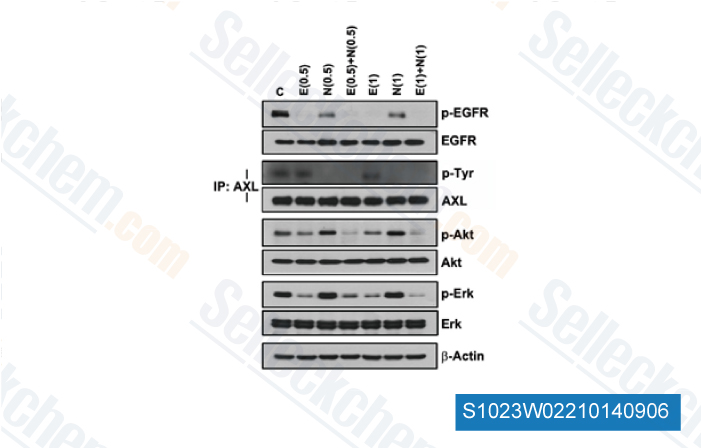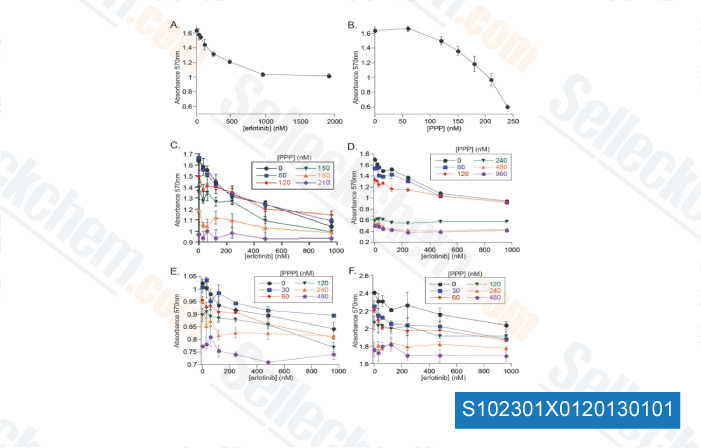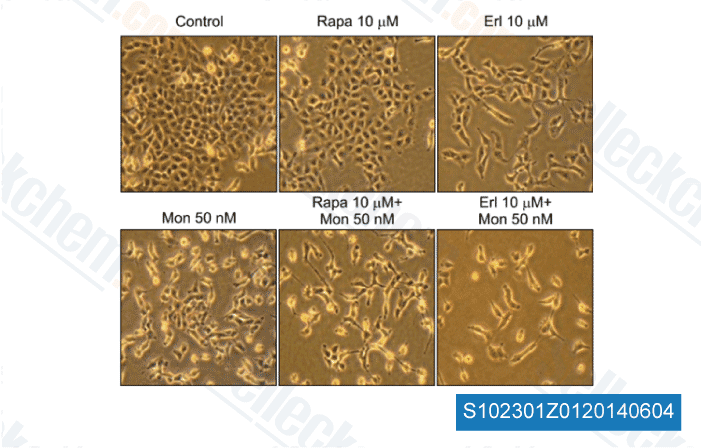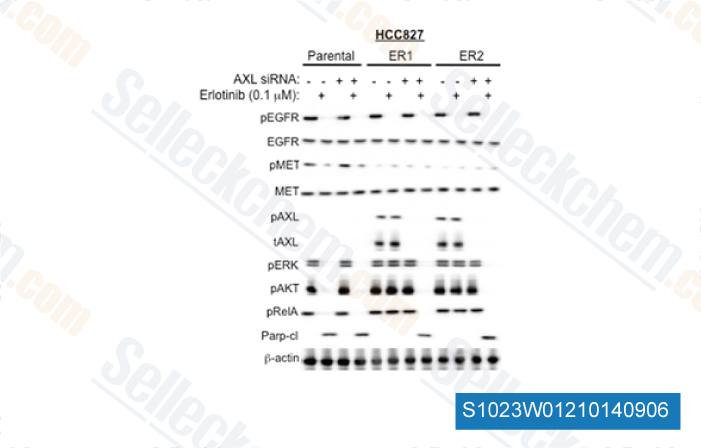|
Toll Free: (877) 796-6397 -- USA and Canada only -- |
Fax: +1-832-582-8590 Orders: +1-832-582-8158 |
Tech Support: +1-832-582-8158 Ext:3 Please provide your Order Number in the email. |
Technical Data
| Formula | C22H23N3O4 |
|||
| Molecular Weight | 393.44 | CAS No. | 183321-74-6 | |
| Solubility (25°C)* | In vitro | DMSO | 78 mg/mL (198.25 mM) | |
| Ethanol | 78 mg/mL (198.25 mM) | |||
| Water | Insoluble | |||
|
* <1 mg/ml means slightly soluble or insoluble. * Please note that Selleck tests the solubility of all compounds in-house, and the actual solubility may differ slightly from published values. This is normal and is due to slight batch-to-batch variations. * Room temperature shipping (Stability testing shows this product can be shipped without any cooling measures.) |
||||
Preparing Stock Solutions
Biological Activity
| Description | Erlotinib is an EGFR inhibitor with IC50 of 2 nM, >1000-fold more sensitive for EGFR than human c-Src or v-Abl. Erlotinib induces autophagy. | ||
|---|---|---|---|
| Targets |
|
||
| In vitro | Erlotinib HCl potently inhibits EGFR activation in intact cells including HNS human head and neck tumor cells (IC50 20nM), DiFi human colon cancer cells and MDA MB-468 human breast cancer cells. Erlotinib HCl (1 μM) induces apoptosis in DiFi human colon cancer cells. [1] Erlotinib inhibits growth of a panel of NSCLC cell lines including A549, H322, H3255, H358 H661, H1650, H1975, H1299, H596 with IC50 ranging from 29 nM to >20 μM. [2] Erlotinib HCl(2 μM) significantly inhibits growth of AsPC-1 and BxPC-3 pancreatic cells. [3] The effects of Erlotinib HCl in combination with gemcitabine are considered additive in KRAS-mutated pancreatic cancer cells. Ten micromolar of Erlotinib HCl inhibits EGFR phospho-rylation at the Y845 (Src-dependent phosphorylation) and Y1068 (auto-phosphorylation) sites. [4] Combination with Erlotinib HCl could down-modulate rapamycin-stimulated Akt activity and produces a synergistic effect on cell growth inhibition. [5] |
||
| In vivo | At doses of 100 mg/kg, Erlotinib HCl completely prevents EGF-induced autophosphorylation of EGFR in human HN5 tumors growing as xenografts in athymic mice and of the hepatic EGFR of the treated mice. [1] Erlotinib HCl (100 mg/Kg) inhibits H460a and A549 tumor models with 71 and 93% inhibition rate. [5] |
Protocol (from reference)
| Kinase Assay: |
|
|---|---|
| Cell Assay: |
|
| Animal Study: |
|
References
Customer Product Validation

-
Data from [Cancer Res, 2014, 4(1):253-62]

-
Data from [Head Neck, 2013, 35, 86-93]

-
Data from [Tuberc Respir Dis, 2013, 75(1), 9-17]

-
Data from [Nat Genet, 2012, 44(8):852-60]
Selleck's Erlotinib has been cited by 647 publications
| Oncogenic RARγ isoforms promote head and neck cancer proliferation through vinexin-β-mediated cell cycle acceleration and autocrine activation of EGFR signal [ Int J Biol Sci, 2025, 21(1):1-16] | PubMed: 39744424 |
| The AURKA inhibitor alters the immune microenvironment and enhances targeting B7-H3 immunotherapy in glioblastoma [ JCI Insight, 2025, e173700] | PubMed: 39928563 |
| Efficacy of amivantamab, a bi-specific antibody targeting EGFR and MET, in ALK-rearranged non-small-cell lung cancer cell lines [ Lung Cancer, 2025, 201:108415] | PubMed: 39922174 |
| Tet methylcytosine dioxygenase 2 (TET2) deficiency elicits EGFR-TKI (tyrosine kinase inhibitors) resistance in non-small cell lung cancer [ Signal Transduct Target Ther, 2024, 9(1):65] | PubMed: 38461173 |
| Activation of the PI3K/AKT signaling pathway by ARNTL2 enhances cellular glycolysis and sensitizes pancreatic adenocarcinoma to erlotinib [ Mol Cancer, 2024, 23(1):48] | PubMed: 38459558 |
| Comprehensive mutational scanning of EGFR reveals TKI sensitivities of extracellular domain mutants [ Nat Commun, 2024, 15(1):2742] | PubMed: 38548752 |
| Oncogenic EML4-ALK assemblies suppress growth factor perception and modulate drug tolerance [ Nat Commun, 2024, 15(1):9473] | PubMed: 39488530 |
| Targeted therapies prime oncogene-driven lung cancers for macrophage-mediated destruction [ J Clin Invest, 2024, 134(9)e169315] | PubMed: 38483480 |
| Targeting ERBB3 and AKT to overcome adaptive resistance in EML4-ALK-driven non-small cell lung cancer [ Cell Death Dis, 2024, 15(12):912] | PubMed: 39695132 |
| Machine learning-aided discovery of T790M-mutant EGFR inhibitor CDDO-Me effectively suppresses non-small cell lung cancer growth [ Cell Commun Signal, 2024, 22(1):585] | PubMed: 39639305 |
RETURN POLICY
Selleck Chemical’s Unconditional Return Policy ensures a smooth online shopping experience for our customers. If you are in any way unsatisfied with your purchase, you may return any item(s) within 7 days of receiving it. In the event of product quality issues, either protocol related or product related problems, you may return any item(s) within 365 days from the original purchase date. Please follow the instructions below when returning products.
SHIPPING AND STORAGE
Selleck products are transported at room temperature. If you receive the product at room temperature, please rest assured, the Selleck Quality Inspection Department has conducted experiments to verify that the normal temperature placement of one month will not affect the biological activity of powder products. After collecting, please store the product according to the requirements described in the datasheet. Most Selleck products are stable under the recommended conditions.
NOT FOR HUMAN, VETERINARY DIAGNOSTIC OR THERAPEUTIC USE.
